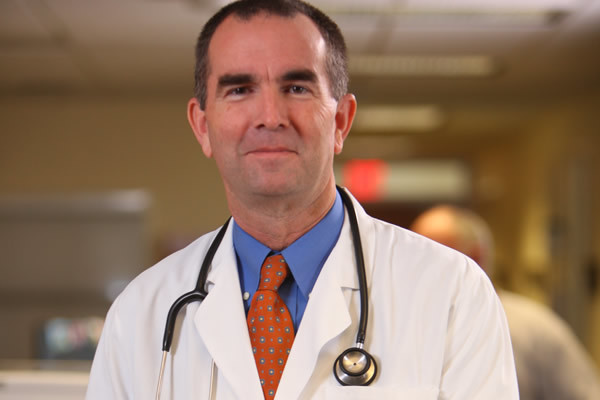When it comes to politics, Ralph Northam doesn’t mince words. In June, the Democratic Virginia gubernatorial candidate garnered widespread attention after referring to U.S. President Donald Trump as a “narcissistic maniac,” and earlier this month, his campaign sent out flyers comparing Trump and Republican gubernatorial candidate Ed Gillespie to the neo-Nazis who rallied in Charlottesville in August.
Despite his knack for levying candid criticism, Northam’s message throughout the Virginia gubernatorial race has been one of progression, inclusivity and collaboration.
Northam served in the Virginia Senate between 2007 and 2014, when he assumed the role of lieutenant governor. He is also a pediatric neurologist and said that his time in the medical field inspired him to enter politics, as he found himself constantly frustrated by the complexities of the insurance industry.
During his years in the state senate, Northam successfully spearheaded a ban on smoking in restaurants. He also promoted physical education in public schools and supported legislation protecting student-athletes, particularly those at risk of sustaining concussions.
Moving forward, Northam said he hopes to prioritize economic and workforce development, as well as health care. One of his proposed initiatives, the G3, which means “Get Skilled — Get a Job — Give Back” would allow Virginians to obtain a free associate’s degree or workforce training credential in “new collar” fields such as cybersecurity, healthcare and clean energy.
Upon completion of their degree or training credential, students would be required to commit to a year of public service in local or state government, a non-profit organization or a small business. Essentially, Northam said, students will be able to access higher education without incurring debt, and they will simultaneously give back to their communities.
In addition to voicing concerns about college affordability, Northam said that millennials have advocated for more attention on the issue of diversity.
We want to make sure that we’re inclusive and that we welcome people to the Commonwealth of Virginia,” he said. “That’s in stark contrast to my opponent and our president.”
“We want to make sure that we’re inclusive and that we welcome people to the Commonwealth of Virginia,” he said. “That’s in stark contrast to my opponent and our president.”
Northam cited his statements regarding the Charlottesville riots earlier this year as proof of his support for inclusivity, and he readily labeled the individuals who provoked the incident as “supremacists.”
In contrast, Trump laid the blame for the event on “both sides” and did not call the protestors neo-Nazis or white supremacists. Gillespie has stated that there is no moral equivalence between the white supremacists and the counter protestors. He also said that the white supremacist protestors were not representatives of the “alt-right” and did not, in fact, fall anywhere on the political spectrum.
Inclusivity starts with leadership,” Northam said. “People listen and follow our leadership, so it’s very important that the governor of Virginia is able to stand up and tell people that we are inclusive, we don’t condone hatred and bigotry and we do live in a very diverse society.”
“Inclusivity starts with leadership,” Northam said. “People listen and follow our leadership, so it’s very important that the governor of Virginia is able to stand up and tell people that we are inclusive, we don’t condone hatred and bigotry and we do live in a very diverse society.”
Northam added that the same logic applies to campus sexual assault, another issue commonly raised by millennial voters.
If elected, Northam plans to supplement his economic and health care initiatives with projects related to renewable energy, gun violence and criminal justice — including the state opioid crisis, which he deemed the “largest challenge in Virginia.”
Although Northam has been a vocal critic of prominent Republicans, he said that his years in Richmond have taught him the importance of working with individuals on both sides of the aisle.
“We can agree to disagree, but at the end of the day, we work together to do the best for Virginia,” Northam said. “That’s what we refer to as ‘the Virginia way.’”

